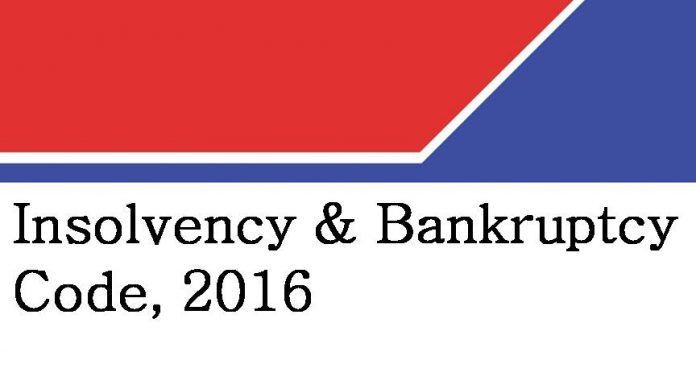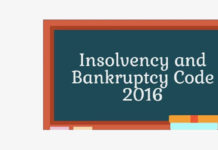Insolvency and Bankruptcy Code, 2016 applies to:
The provisions of this Code shall apply to—
a) any company incorporated under the Companies Act, 2013 or under any previous company law;
b) any other company governed by any special Act for the time being in force,
except in so far as the said provisions are inconsistent with the provisions of such special Act;
c) any Limited Liability Partnership incorporated under the Limited Liability
Partnership Act, 2008;
d) such other body incorporated under any law for the time being in force, as
the Central Government may, by notification, specify in this behalf;
e) personal guarantors to corporate debtors;
f) partnership firms and proprietorship firms; and
g) individuals, other than persons referred to in clause (e);
in relation to their insolvency, liquidation, voluntary liquidation or bankruptcy, as the case may be.
INSOLVENCY RESOLUTION AND LIQUIDATION FOR CORPORATE PERSONS
INSOLVENCY RESOLUTION AND LIQUIDATION FOR CORPORATE PERSONS shall apply to matters relating to the insolvency and liquidation of corporate debtors where the minimum amount of the default is one lakh rupees:
Few relevant definitions:
1)corporate applicant” means—
• corporate debtor; or
• a member or partner of the corporate debtor who is authorised to make
an application for the corporate insolvency resolution process under the constitutional document of the corporate debtor; or
• an individual who is in charge of managing the operations and resources of the corporate debtor; or
• a person who has the control and supervision over the financial affairs
of the corporate debtor;
2) “dispute” includes a suit or arbitration proceedings relating to—
• the existence of the amount of debt;
• the quality of goods or service; or
• the breach of a representation or warranty;
3) “financial creditor” means any person to whom a financial debt is owed and includes a person to whom such debt has been legally assigned or transferred to;
4) “financial debt” means a debt along with interest, if any, which is disbursed against the consideration for the time value of money and includes—
• money borrowed against the payment of interest;
• any amount raised by acceptance under any acceptance credit facility or its de-materialised equivalent;
• any amount raised pursuant to any note purchase facility or the issue of bonds, notes, debentures, loan stock or any similar instrument;
• the amount of any liability in respect of any lease or hire purchase contract which is deemed as a finance or capital lease under the Indian Accounting Standards or such other accounting standards as may be prescribed;
• receivables sold or discounted other than any receivables sold on nonrecourse basis;
• any amount raised under any other transaction, including any forward sale or purchase agreement, having the commercial effect of a borrowing;
• any derivative transaction entered into in connection with protection against or benefit from fluctuation in any rate or price and for calculating the value of any derivative transaction, only the market value of such transaction shall be taken into account;
• any counter-indemnity obligation in respect of a guarantee, indemnity, bond, documentary letter of credit or any other instrument issued by a bank or financial institution;
• the amount of any liability in respect of any of the guarantee or indemnity for any of the items referred to in above points;
5) “financial position”, in relation to any person, means the financial information of a person as on a certain date;
6) “insolvency resolution process costs” means—
• the amount of any interim finance and the costs incurred in raising such finance;
• the fees payable to any person acting as a resolution professional;
• any costs incurred by the resolution professional in running the business of the corporate debtor as a going concern;
• any costs incurred at the expense of the Government to facilitate the insolvency resolution process; and
• any other costs as may be specified by the Board;
7) “insolvency resolution process period” means the period of one hundred and eighty days beginning from the insolvency commencement date and ending on one hundred and eightieth day;
8) “operational creditor” means a person to whom an operational debt is owed and includes any person to whom such debt has been legally assigned or transferred;
9) “operational debt” means a claim in respect of the provision of goods or services including employment or a debt in respect of the repayment of dues arising under any law for the time being in force and payable to the Central Government, any State Government or any local authority;
10) “related party”, in relation to a corporate debtor, means—
• a director or partner of the corporate debtor or a relative of a director or partner of the corporate debtor;
• a key managerial personnel of the corporate debtor or a relative of a key managerial personnel of the corporate debtor;
• a limited liability partnership or a partnership firm in which a director, partner, or manager of the corporate debtor or his relative is a partner;
• a private company in which a director, partner or manager of the corporate debtor is a director and holds along with his relatives, more than two per cent. of its share capital;
• a public company in which a director, partner or manager of the corporate debtor is a director and holds along with relatives, more than two per cent. of its paid-up share capital;
• anybody corporate whose board of directors, managing director or manager, in the ordinary course of business, acts on the advice, directions or instructions of a director, partner or manager of the corporate debtor;
• any limited liability partnership or a partnership firm whose partners or employees in the ordinary course of business, acts on the advice, directions or instructions of a director, partner or manager of the corporate debtor;
• any person on whose advice, directions or instructions, a director, partner or manager of the corporate debtor is accustomed to act;
• a body corporate which is a holding, subsidiary or an associate company of the corporate debtor, or a subsidiary of a holding company to which the corporate debtor is a subsidiary;
• any person who controls more than twenty per cent. of voting rights in the corporate debtor on account of ownership or a voting agreement;
• any person in whom the corporate debtor controls more than twenty per cent. of voting rights on account of ownership or a voting agreement;
• any person who can control the composition of the board of directors or corresponding governing body of the corporate debtor;
• any person who is associated with the corporate debtor on account of—
- participation in policy making processes of the corporate debtor; or
- having more than two directors in common between the corporate debtor and such person; or
- interchange of managerial personnel between the corporate debtor and such person; or
- provision of essential technical information to, or from, the corporate debtor;
11) “resolution applicant” means any person, who individually or jointly with any other person, submits a resolution plan to the resolution professional pursuant to the invitation made under clause (h) of sub-section (2) of section 25;
12) “resolution plan” means a plan proposed by resolution applicant for insolvency resolution of the corporate debtor as a going concern in accordance with INSOLVENCY RESOLUTION AND LIQUIDATION FOR CORPORATE PERSONS;




